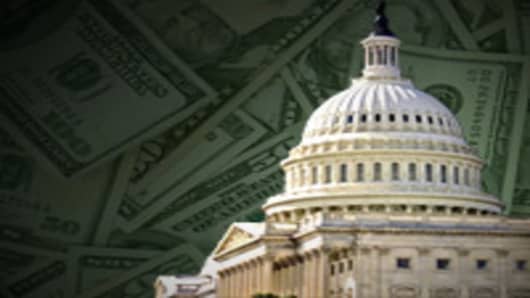When the bold deficit-slashing measures were greeted last week with widespread praise, Democrat Erskine Bowles, the commission's co-chairman and a former chief of staff to President Bill Clinton, cheerfully exclaimed, "The era of deficit denial in Washington is over."
Well, apparently not quite yet. Bowles said this week that he was "deeply disappointed" by the sweeping Obama-GOP deal, complaining that the plan was not linked to any long-term restraint.
If the Obama-GOP plan is enacted, as generally expected, the United States will become the only major industrialized economy in the world not to move toward fiscal curbs next year — even though Congress is considering legislation that would move in the other direction. That effort involves freezing the budgets of most Cabinet departments and cutting nearly $46 billion from the president's spending requests. The House passed the measure 212-206 on Wednesday and sent it to the Senate.
The outcry over ballooning deficits was crucial in the last month's midterm elections, which handed majority control of the House to Republicans and gave them added clout in the Senate. The issue was a rallying point for the tea party movement. A flock of freshmen legislators will take office in January having campaigned for smaller government and fiscal discipline.
That Obama could pivot so quickly from emphasizing the need for deficit reduction — such as his plan late last month to freeze the pay of most executive branch employees — to endorsing a GOP-backed plan to extend Bush-era tax cuts for all income brackets, plus a host of other costly measures, took much of Washington by surprise. No one was more surprised than many in his own party, who promptly revolted.
The House Democratic caucus voted on Thursday — by nonbinding voice vote — in opposition to the tax deal.
That raised the prospect that the legislation could pass the House with more Republican than Democratic votes, a first for Obama's presidency. The tax deal has more support among Democrats in the Senate, where a test vote is set for Monday.
Republicans embracing the deal have been doing some fancy footwork themselves, making deficit reduction a top political priority while also supporting deficit-bloating tax cuts for those in all income brackets, as well as the new spending items in the package.
They argue that, even though voters may have chosen them for their vows for smaller government, low taxes can produce growth — and jobs. With unemployment stuck near 10 percent, now is not the time to raise taxes on anyone, they argue.
Even as Congress hashed over the costly new package, the Treasury Department said Friday the government spent $150.4 billion more than it took in during November — a 25 percent bigger deficit than in November 2009. If the tax-cut deal is enacted, the federal deficit for the budget year that began Oct. 1 will soar to around $1.5 trillion, a record, according to private forecasters. The pact would extend cuts in income tax rates for all earners that would otherwise expire Dec. 31, renew long-term jobless benefits for all of 2011 and trim Social Security taxes for one year. It would also reinstate the expired estate tax, but with generous terms.
Trying to widen support, negotiators added tax credits to promote ethanol and other forms of alternative energy. Provisions designed to increase production of hybrid automobiles, biodiesel fuel, energy-efficient homes, coal and energy-efficient household appliances would be extended through the end of 2011. The measure also includes tax breaks for commuters who use mass transit.


